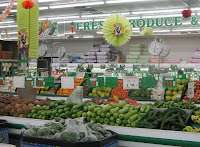 What else would we do on Christmas Day?
What else would we do on Christmas Day? We headed to Chinatown for a yummy, hot and uber-healthy Vietnamese soup bowl. After our delicious meal and some strong Vietnamese coffee my husband I were jazzed to set out to find new things to juice at the local Asian Supermarket.
Here is what we found.
Watercress - produces a green juice, can be juiced like parsley or cilantro, adds a peppery, bitter flavor, don't drink watercress juice by itself.
Traditional Uses: Anemia, circulation, intestinal problems, skin problems, weight loss, bladder problems, hair loss, kidneys, female endocrine system, thyroid
Good Source of: Calcium, Potassium, Chlorophyll, Chloride, Sulfur, Phosphorus, Vitamin C
Lemongrass - Lots of fibers and not a lot of juice came out. It also made my juicer make really scary noises! Maybe I will stick to Lemongrass in my soup or tea.
Traditional Uses: Blood cleanser, detoxes liver, pancreas, kidney, bladder and the digestive tract. Expels uric acid, cholesterol, excess fats and other toxins in the body while stimulating digestion, blood circulation, and lactation, alleviates indigestion, gastroenteritis and acne, reduces blood pressure. Just boil some lemon grass leaves, let it cool for a while and drink the liquid.
Ginger - Strong taste but a favorite if you want to add some Kick to your juice.
Traditional Uses: Inflammation, Headaches, Diarrhea, Digestion, Cholesterol, Gas & Bloating, Cold & Flu, Immune System, Energy, Nausea (especially in pregnant women), Arthritis, Menstrual Cramps, Circulatory Disorders, Enhances Mood/Relieves Stress, Mouth Freshener, Anti-Cancer, Natural Preservative/Bactericide/Meat Tenderizer and helps to block harmful effects of prostaglandin (substance leading to inflammation of blood vessels in brain)
Good Source of: Potassium, Calcium, Iron, Magnesium, Protein, Selenium, Sodium, Vitamin C, Vitamin E, Vitamin B6
Chinese Broccoli - Lots of stalk and thick, blue-green leaves and not so much of the florets makes it perfect for juicing. It is similar to kale and has a slightly sweeter taste than broccoli.
Good Source of: This food is low in Sodium, and very low in Cholesterol. It is also a good source of Vitamin E (Alpha Tocopherol), Vitamin B6, Iron, Phosphorus, Zinc and Copper, and a very good source of Dietary Fiber, Vitamin A, Vitamin C, Vitamin K, Thiamin, Riboflavin, Folate, Calcium, Magnesium, Potassium and Manganese.
Green Mango - The taste was very surprising, it's not like a ripe mango at all, it is very tart due to the high Vitamin C content in the raw fruit compared to a ripened one. Raw mangos also comprises unique proteolytic enzymes. Be aware Blending it with a sweet fruit and chilling over ice on a hot desert day sounds very refreshing. **Dieters beware: for every 100g of mango in your diet may help you to gain about 75-85 calories. The raw mango is full of starch but once the fruit gets ripened the starch transforms to sugar.
Traditional Uses: digestion, antioxidant, blood builder, anemia, menstrual cramps
Good Source of: Vitamin C, Vitamin A, phosphorous, calcium, magnesium, sodium copper, selenium, iron, zine, manganese, and traces of Vitamin E, Vitamin B (thiamin), riboflavin, niacin, pantothenic acid, Vitamin B6, Tocopherol, Vitamin K
Baby Bok Choy - Also called Chinese chard and is in the cabbage family. Typically used in soups and stir-fry we decided to see how it tastes juiced.
Traditional Uses: expel toxins, cancer-fighting, healthy digestion, antioxidants
Good Source of: vitamin C, calcium, folic acid, beta-carotene, vitamin A, potassium, vitamin B6






